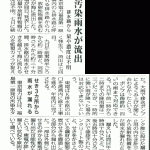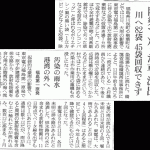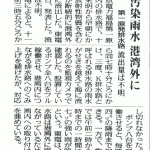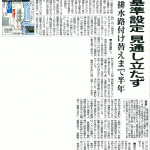Original Japanese written by staffer
The English below translated from the original Japanese by Heeday
The English translation edited by Rev. Dr. Henry French, ELCA
(Sources: articles of September 10th, 12th, and 13th, 2015 editions of the Fukushima Minpo newspaper and of August 12th, 2015 edition of the Asahi Shimbun newspaper)
▼Click each image to enlarge it and read the caption.
A deluge hit much of Kanto and Tohoku, Japan, this September. On the 9th and 11th days of the month, some rain water containing radioactive substances ran into the Pacific Ocean out of a drainage at TEPCO’s Fukushima Daiichi Nuclear Power Plant (NPP).
The contaminated flow went on and off out of “Drainage K,” within the NPP’s premises. Built to make rain water run out of the area around the buildings containing a reactor, this drainage system directly connects to the ocean outside the NPP’s port. Even before the recent deluge, TEPCO had discovered that some rain water containing radioactive substances had leaked and they took emergency countermeasures to fix the problem last April. Still, at least seven such leakages have been confirmed since then.
Fukushima Prefecture’s government is requesting the Nuclear Regulation Authority (NRA) to set up a standard for detecting contaminated rain water. So far, no such a standard is in sight.
Japan’s Nuclear Reactor Regulation Law has no clear regulation on the treatment of contaminated rain water. The NRA is reluctant to set up a standard for detecting contaminated rain water since there is no law currently in place requiring such detection. A related source revealed that, “To detect and handle contaminated rain water, we need to amend the relevant law, which takes a long time.”
Radioactive rain water ran into the ocean again and again, even before the emergency measures taken last April. TEPCO, though it was aware of this fact, did not announce it until the end of February this year.
Against this background, most fishery operators have a deep-rooted distrust in TEPCO.
More typhoons are expected to hit Japan in the coming weeks. There are still some rumors claiming that marine products from the ocean close to Fukushima are contaminated. Such rumors no doubt hurt fishery operators’ livelihood. TEPCO is advised to take countermeasures with sincerity. Otherwise, among many other problems, more such bad rumors might arise.




